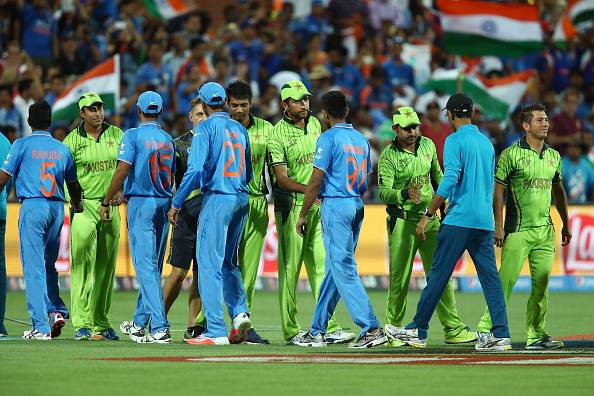
All eyes are currently on Indian PM Narendra Modi’s three day visit to China (May 14-16). Yet on the eve of the PM’s departure, another important announcement was made. India and Pakistan will resume cricketing ties at the end of the year in the United Arab Emirates.
During a Parliamentary meeting on Tuesday, the Indian PM is supposed to have told his party members: “We have taken the decision to start a cricket series between both countries to improve our relations.”
Pakistan Cricket Board President, Shahryar Khan, had met Finance Minister and Minister for Information and Broadcasting Arun Jaitley on Wednesday and said “We are on right track for India-Pakistan series in December after my meetings with Jagmohan Dalmiya, Arun Jaitley and Anurag Thakur.”
There have been mixed reactions to this decision of resumption of ties. While many former cricketers from both countries including Zaheer Abbas, Kiran More have welcomed the decision to resume ties, there are those who believe that rekindling cricketing ties with Pakistan will be of no benefit – and this includes not just politicians, but even sportsman turned politicians. A BJP MP and former bureaucrat RK Singh opposes the resumption of cricketing ties with Pakistan, referring to Pakistan’s inaction against Hafiz Saeed and bail recently granted to 26/11 mastermind Zakiur Rehman Lakhvi. He stated, “what is point of playing cricket with them…I do not understand.”
His views were echoed by another BJP MP, and former cricketer Kirti Azad who stated that cricket diplomacy has failed on numerous occasions, and it is not likely that it will be successful this time either so it is a futile exercise. The Shiv Sena, an ally of the BJP, which has always been opposed to cricketing ties with Pakistan backed the demand to not resume ties with Pakistan
If one were to specifically look at the impact of a cricket series on India-Pakistan ties, there is no doubt, that a cricket series by itself does not have the capacity to improve bilateral relations between both countries.
It would be fair to say that cricket series in the past may have not been able to help in peace, but they have certainly been an important means of enhancing goodwill and reducing the sense of animosity between both countries. A recent example is the March 2004 cricket series, dubbed the “Friendship Series,” during PM Atal Bihari Vajpayee’s tenure. Even then, a number of ministers objected to the visit, but Vajpayee instructed the Indian team to win not just on the field but also people’s hearts. This series was barely two months after Vajpayee’s visit to Islamabad in connection with the SAARC Summit.
If one were to leave the politics of cricket aside, those opposing the cricket series forget that a number of Pakistani commentators have contracts with sports channels and are frequently in India. Both countries also compete with each other in kabaddi and hockey. Those who are opposed to a cricket series should first clarify whether they subscribe to the view of disruption of all sporting ties.
Apart from this, if cricket series have no positive impact, it is not clear as to how they harm the relationship, and whether abandoning sporting ties will change the behavior of state and non-state actors in Pakistan hostile to India. Some ties will at least ensure that citizens get to interact, and cricketing fans on both sides do not suffer due to naysayers.
In this context, it is extremely important for the political leadership on both sides to take charge, and make certain decisions with regard to people-to-people ties and sporting exchanges, which may face the wrath of some, but which will help in generating a degree of goodwill. The revival of cricketing ties is one such decision. The onus is both on PM Modi and PM Sharif to ensure that interactions and exchanges in the sphere of culture and sports are not affected by political tensions. In the past few months, Modi has clearly tweaked his Pakistan policy and exhibited realism even though he has had to contend with scathing criticism from some of his supporters for being weak and has faced international pressure. The Indian PM’s outreach towards Pakistan is all the more creditable, and somewhat of a gamble, because he has taken these steps at a time when he is facing flak for not having delivered in his first year in office. Hopefully saner elements on both sides will ensure that petty politics do not affect sporting ties between both nations.
***


